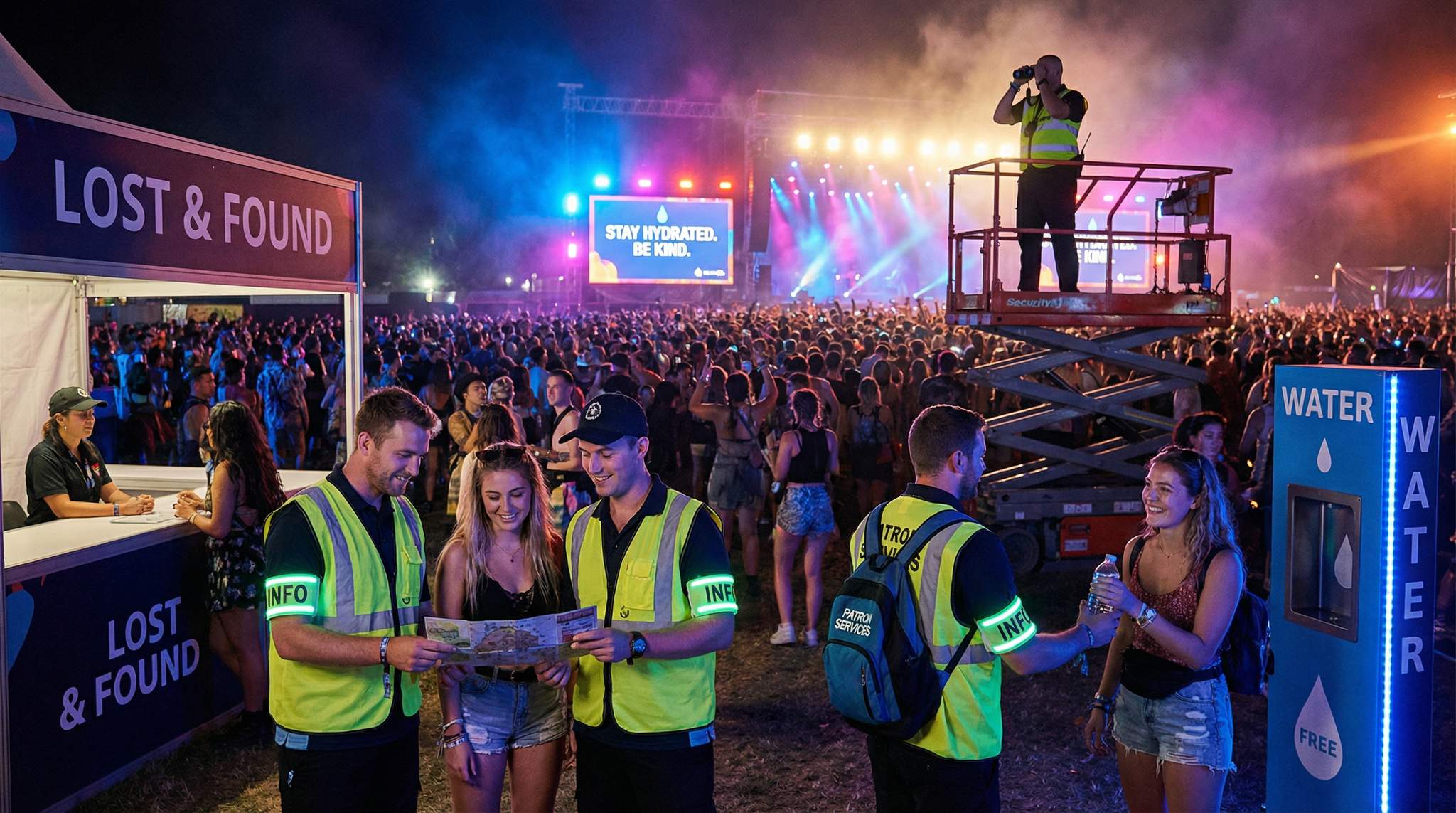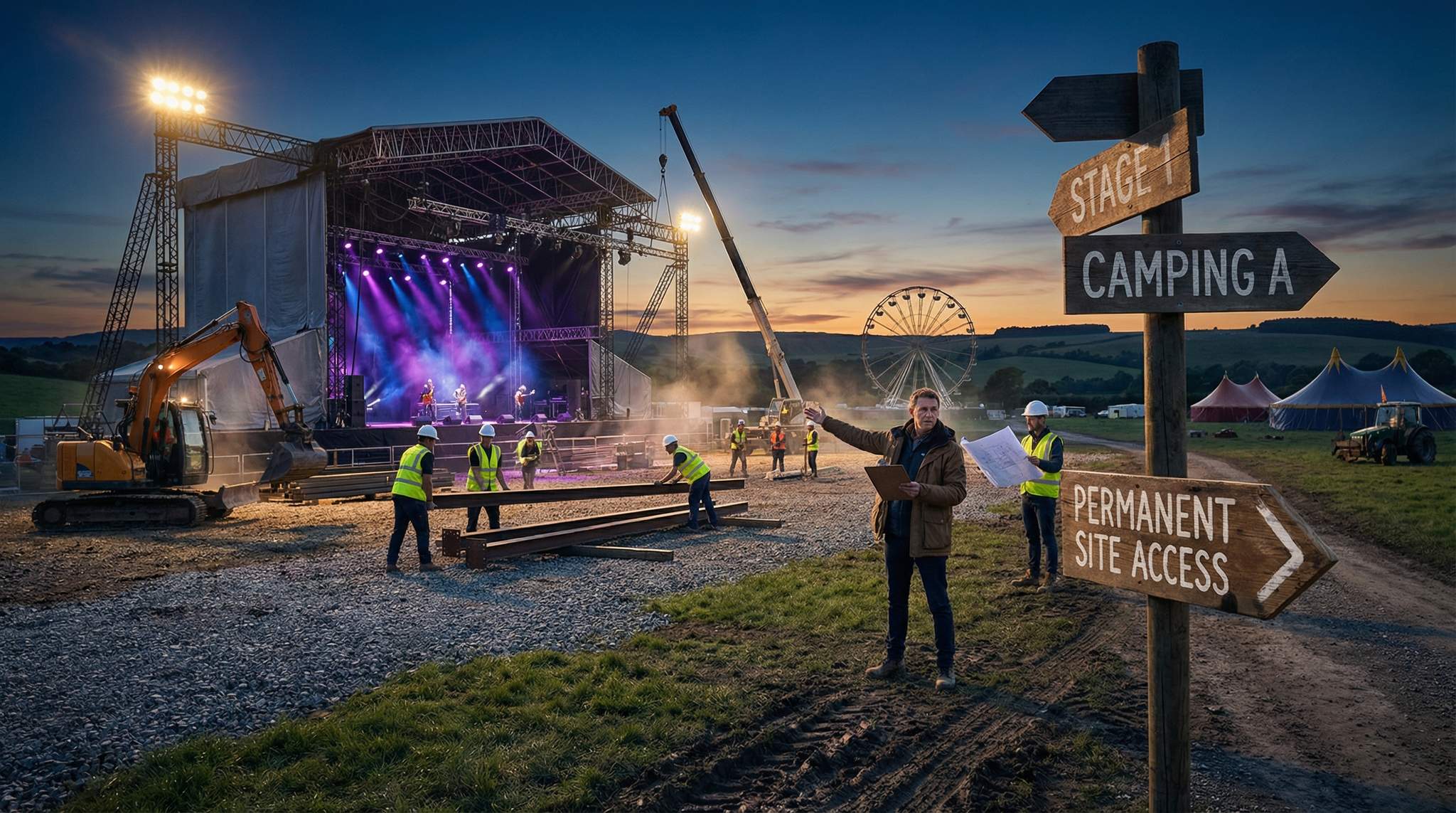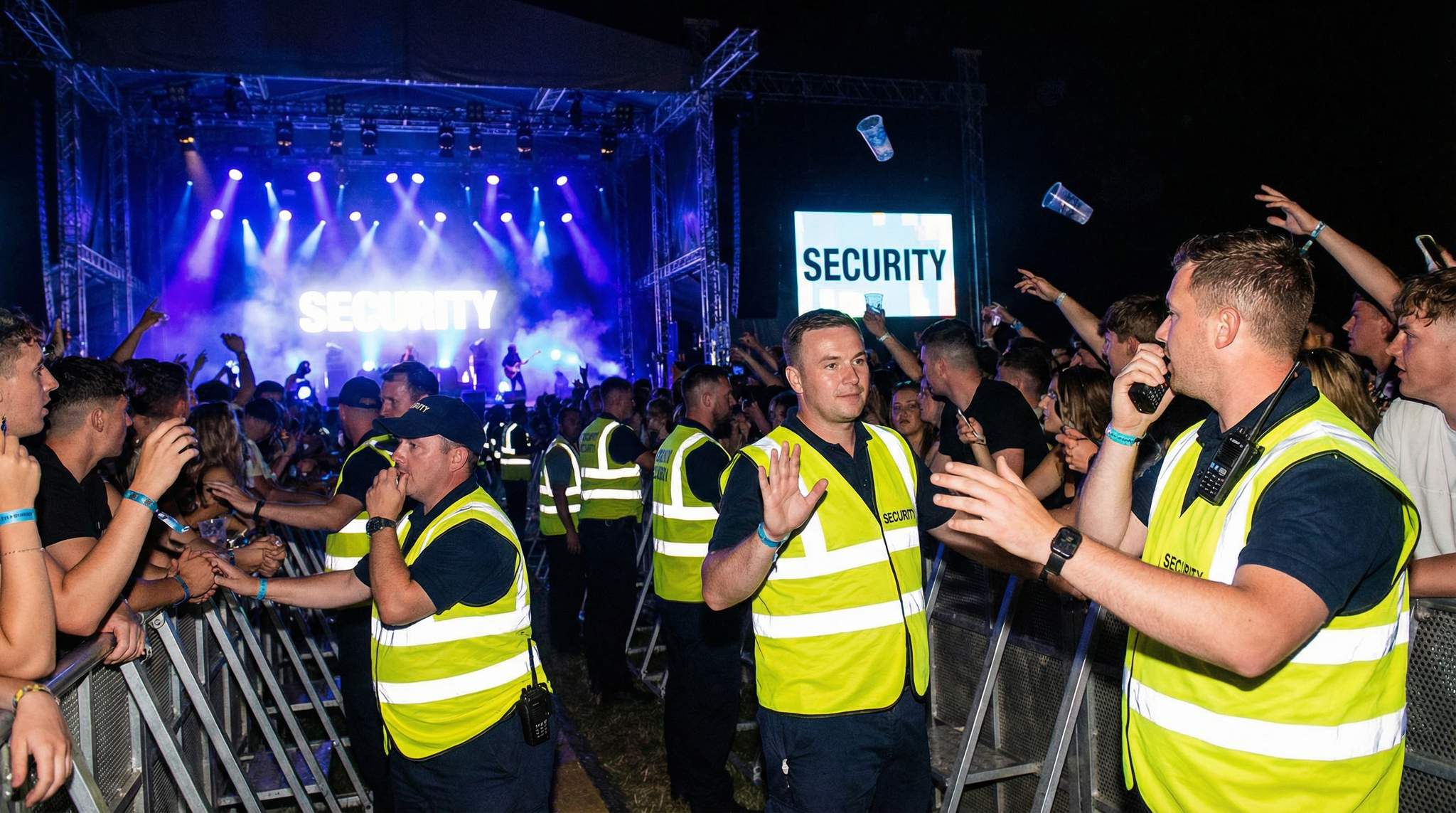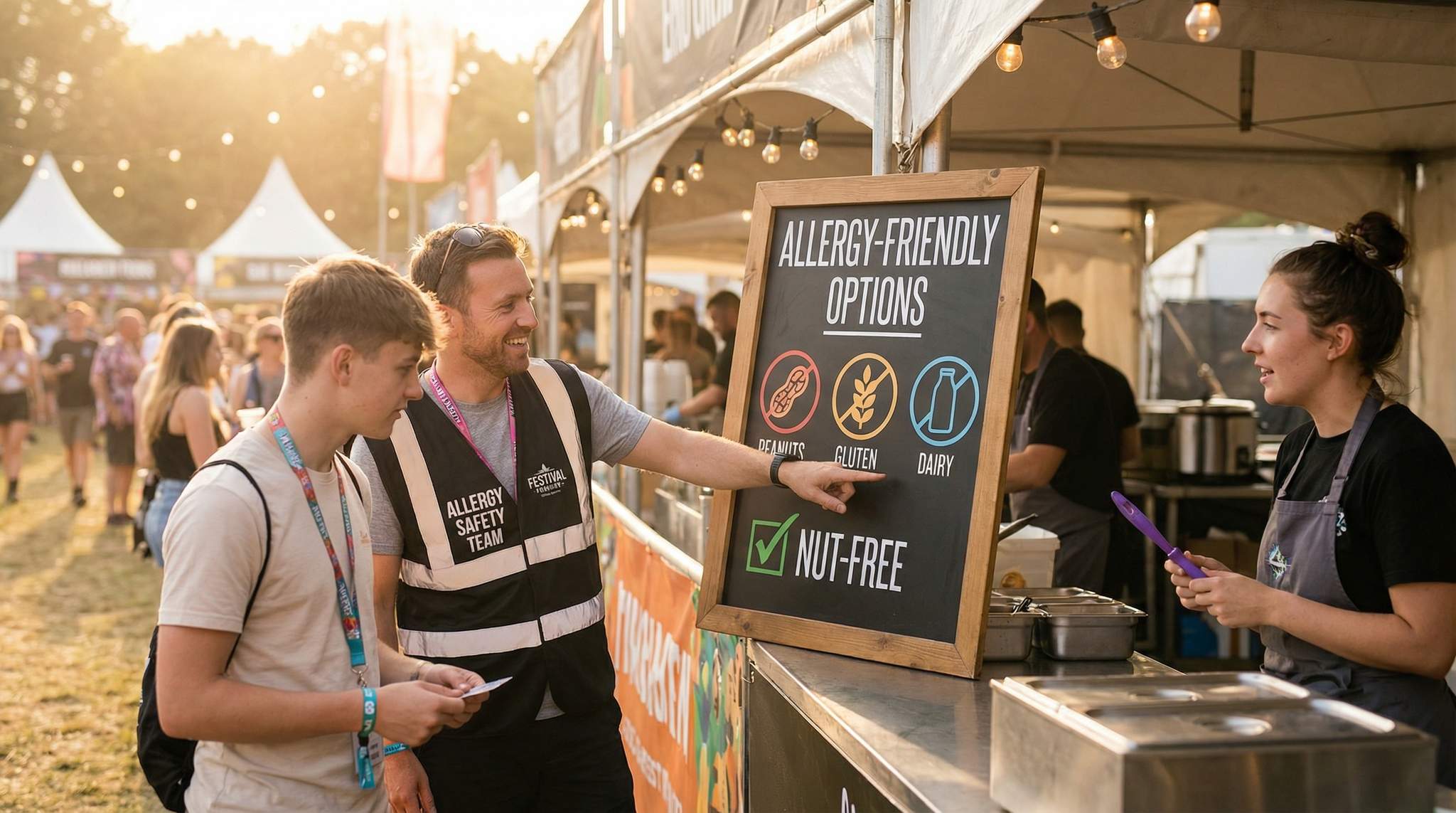Keeping a Vigilant Eye on the Crowd
Once the festival is in full swing, active crowd monitoring becomes a top priority. Roaming safety teams should continuously patrol the grounds, observing crowd density and mood in real-time. By moving through the audience, these staff can sense the atmosphere and spot early signs of distress or tension. Key times to ramp up monitoring include high-traffic moments – for example, immediately after a headliner finishes when thousands might move at once toward exits, food stalls, or the next stage. Proactive roaming teams not only identify potential issues but also deter misbehavior by their visible presence.
Using Elevated Spotters and Technology
In very large crowd areas, having eyes in the sky can make all the difference. Festivals commonly deploy security personnel on elevated platforms (such as scissor lifts or stage-side towers) to get a bird’s-eye view over dense crowds. These “crowd spotters” scan for any dangerous crowd surges, overcrowding, or people in trouble. At major events, front-of-house spotters positioned by the mix tower or on raised walkways keep watch for unusual movements or wave patterns in the audience. In addition, technology can aid human spotters – CCTV cameras, drones, and other monitoring systems help cover blind spots and provide real-time data on crowd distribution, adhering to crowd management and monitoring safety standards. With this vantage, festival organizers can quickly direct security teams to intervene if they detect a crush forming or if a section is getting too congested.
Managing Crowd Flow at Peak Moments
Even with vigilant monitoring, crowd surges will happen during popular moments. The goal is to manage them safely. Plan and rehearse crowd flow for peak times such as the end of headline sets, fireworks finales, or sudden weather events. Train your staff to temporarily open additional exit routes or hold back certain gates to prevent choke points. For example, if one stage empties and another is about to start, use one-way routes or barriers to guide foot traffic and avoid head-on crowd collisions. Communication is crucial: instruct MCs or video screens to broadcast gentle reminders for attendees to move slowly and follow staff directions.
Many tragic incidents (like the Astroworld 2021 crowd crush) show how dangerous uncoordinated surges can be, as safety plans often fail to account for key crowd issues. Learning from such cases, a prepared team will deploy extra stewards at pinch points and have a clear protocol to respond if crowds become too dense or unruly. Quick decision-making – even pausing the music or announcing a delay – can relieve pressure and keep people safe.
Hydration and Wellness Services
Keeping the crowd safe isn’t just about avoiding physical crush – it’s also about attendee health. If the weather is hot or the dancing vigorous, hydration becomes a safety issue. Savvy festival organizers provide free water refill stations and may even dispatch water teams: staff or volunteers carrying water backpacks or bottles to hand out in the crowd’s hottest areas. The provision of clean drinking water on-site is essential to prevent dehydration and heat illnesses.
Make sure water points are well-marked with signage, and consider having roaming volunteers remind people to drink water and take breaks. In extreme heat, some festivals also set up misting tents, shade areas, or give away electrolyte ice pops. These small touches can prevent medical emergencies and show the audience that you care about their well-being.
Planning a Festival?
Ticket Fairy's festival ticketing platform handles multi-day passes, RFID wristbands, and complex festival operations.
First aid stations should be clearly visible and staffed with medical professionals ready to jump into the crowd when needed. Encourage attendees to seek help for themselves or friends at the first sign of overheating, exhaustion, or any distress. By actively promoting wellness – through hydration, rest areas, and accessible medical care – festivals can keep the energy high without compromising safety.
Lost and Found: From Missing Phones to Missing Persons
Inevitably, with thousands of people on-site, items and even people can get lost. A well-run festival anticipates this and sets up efficient lost-and-found and lost-person procedures. For lost items, establish a dedicated Lost & Found booth early on, and encourage staff and attendees to turn in any found belongings. Keep a log (ideally digital and updated in real time) of items turned in – this way, a frantic guest looking for their phone or wallet can be quickly reassured if it’s been found. After the event, having an online system for claiming lost items can continue the good service, but during the event the immediate goal is to reduce stress by reuniting people with their stuff.
For lost people – whether it’s a child who wandered off or friends separated in a crowd – swift communication and compassionate assistance are key. Make sure all staff know the protocol for a missing child report: typically, alert security control immediately with the child’s description and last seen location, while other staff calmly search the area. Many family-friendly festivals have a designated Lost Kids center or welfare tent where trained staff look after missing children until parents arrive. Staff and stewards should be fully trained to handle these situations – at reputable events, a lost child is treated as a top priority with all teams alerted, consistent with advice for keeping children safe at festivals. It also helps to establish a clearly marked meeting point for separated groups (for example, a big sign or distinctive landmark) and advertise it in the festival guide, so that if adults in a group lose each other, they know where to regroup.
Prevention can make a huge difference. For events expecting families, consider utilizing an event registration platform for child ID wristbands at the entrance. Parents can write their contact number on a wristband for their kids, so any staff member who finds a lost child can quickly call the parents. Likewise, ensure your Lost & Found booth has a way to announce found items or important messages (without causing panic) – for instance, a board listing high-value items found, or app notifications for lost items/pets.
“Ask Me” Teams and Information on the Go
An often overlooked aspect of crowd management is simply providing information and help in real time. This is where mobile “Ask Me” teams or roaming info ambassadors shine. Equip some of your volunteers or staff with “INFO” signs or identifiable uniforms that signal they are there to help. These roving information teams can answer common questions (like schedule times, directions to stages or facilities, what food vendors are open late) and help attendees feel cared for. By mingling with the crowd, they not only guide people and reduce confusion, but can also relay any on-ground feedback or issues back to event control.
Having visible, friendly staff throughout the venue enhances both safety and service. A guest who might be unsure where to go or is anxious in a big crowd will appreciate a reassuring answer from an official staff member. Additionally, encourage all staff – even those not specifically assigned to info duty – to be approachable and proactive if they see someone looking lost or distressed. Simple customer service gestures, like offering directions or assistance, can prevent small issues from escalating. For example, if a large cluster of people is gathering at a closed gate, an informed staffer can quickly explain alternate routes or the timing for opening, defusing frustration. Good communication on the ground keeps the crowd calm and content.
Need Festival Funding?
Get the capital you need to book headliners, secure venues, and scale your festival production.
Continuous Monitoring and Adapting on the Fly
No matter how much planning is done, festivals are dynamic environments. Conditions can change – an unexpected downpour, an artist running late, or a viral social media rumor can all affect crowd behavior. That’s why the best festival producers treat crowd management and patron services as active, ongoing processes throughout the event. Use all the tools at your disposal: roaming teams feeding back observations, spotters on platforms, CCTV in the control room, and even social media monitors checking attendee sentiment online. Hold regular briefings during the event (even short on-radio check-ins each hour) so that security, operations, and customer service teams stay aligned.
Be ready to adapt your plans in real time. If you notice one water station is overwhelmed with long lines, deploy extra water vendors or direct people to another refill point via signage or announcements. If a particular area of the festival is getting unexpectedly crowded due to a surprise guest appearance, react by sending more security and opening up space if possible. Flexibility is the name of the game. The hallmark of a seasoned festival organizer is the ability to read the crowd’s pulse and make adjustments on the fly – whether it’s re-routing foot traffic, dispatching more medics to an area, or adding an impromptu information announcement to clear up confusion.
Safety and Service Go Hand in Hand
In the end, crowd monitoring and patron services are two sides of the same coin when the festival is live. A safe crowd is usually a happy crowd, and taking care of attendees’ needs helps prevent safety issues. By actively watching over the crowd’s well-being – through vigilant monitoring, quick responses to issues, and thoughtful amenities – festival producers can create an environment where attendees feel secure and valued. This not only averts disasters but also boosts the overall experience, turning first-time attendees into loyal fans.
Every festival, big or small, benefits from this dual focus on safety and service. The next generation of festival producers can take these hard-earned lessons – from deploying crowd spotters and water stations to training info-wielding volunteers – and build upon them. By doing so, they carry forward a legacy of wisdom, care, and professionalism that will keep the magic of festivals alive for years to come.
Frequently Asked Questions
How do festival organizers monitor crowd safety effectively?
Organizers use roaming safety teams to patrol grounds and observe mood, combined with elevated spotters on platforms or towers for a bird’s-eye view. Technology like CCTV cameras and drones covers blind spots, while staff monitor high-traffic moments to detect surges or distress early.
How can festivals manage crowd flow during peak moments?
Staff manage surges by rehearsing flow plans for headline finishes and using one-way routes or barriers to guide traffic. Security may temporarily open additional exits or hold back gates to prevent choke points, while MCs broadcast reminders for attendees to move slowly and follow directions.
What hydration services should festivals provide for attendee safety?
Festivals must provide free water refill stations and dispatch water teams with backpacks to high-heat areas to prevent dehydration and heat illness. Clear signage, misting tents, and roaming volunteers reminding people to drink water are essential measures to maintain wellness during vigorous activity or hot weather.
What is the protocol for handling lost children at festivals?
Staff immediately alert security control with a description and location while searching the area. Many events utilize a designated Lost Kids center or welfare tent where trained staff care for children until parents arrive. Prevention methods include using registration platforms for child ID wristbands containing parent contact numbers.
Why are roaming information teams important for festival management?
Roaming “Ask Me” teams equipped with visible signs or uniforms provide real-time assistance, answering questions about schedules and directions. These ambassadors help reduce confusion, guide traffic, and relay on-ground feedback to event control, preventing small frustrations from escalating into larger safety issues.
How should festivals handle lost and found items?
Organizers establish a dedicated booth early on and maintain a real-time digital log of turned-in belongings to quickly reassure guests. Efficient procedures involve encouraging staff and attendees to turn in items, using apps for notifications, and creating an online system for claiming lost property after the event.





